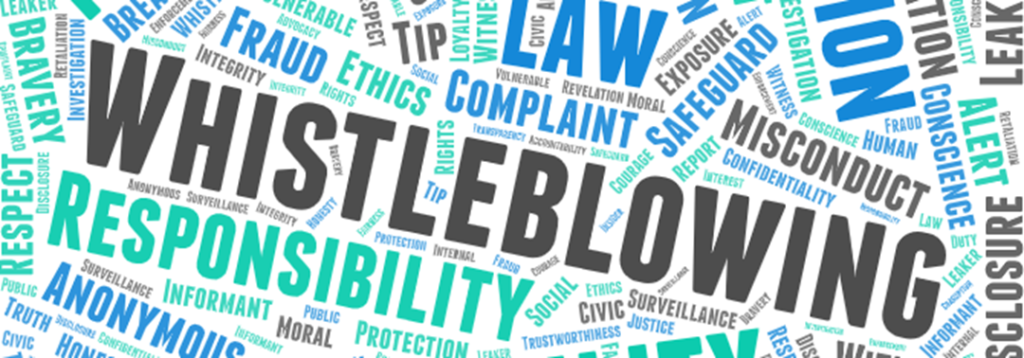
World Whistleblower Day is celebrated each year on 23 June to honour the courageous individuals who call attention to corrupt conduct and expose wrongdoing. To mark the occasion, we thought we would reiterate how your organisation can benefit from having an external Speak Up program and provide an avenue for whistleblowers. By proactively addressing unethical behaviour, you can create a positive work environment that fosters creativity, innovation, and growth. An externally operated hotline indicates to internal and external stakeholders that you are serious about encouraging your people to Speak Up, and that your organisation takes psychosocial and illegal activities seriously.
Whistleblowing is an action by an existing or former employee (or other person defined in Part 9.4AAA of the Corporations Act) that exposes, discloses, or reveals misconduct that the individual has reasonable grounds to suspect has occurred, or will continue to occur. A whistleblower program supports the growth of integrity and good corporate governance. To mitigate the risks arising from unethical behaviour, businesses require a well-designed and well-communicated whistleblower reporting program in place. This program should prioritise clear reporting mechanisms, independence, confidentiality and ensure protection for the whistleblower.
A positive corporate environment needs to be practiced from the top down. While many managers and directors think they know what is going on in their company, the truth is they don’t know what they don’t know. This Dunning-Kruger effect is all about the unknown unknowns (Dunning, 2011). In enabling your employees an opportunity to Speak Up, avenues for more open discussion and information can flow. Engaging an external provider is just one mechanism we encourage within organisations to enable your people to feel comfortable raising their concerns. Organisations also need clear internal reporting lines and policies such as codes of conduct, whistleblower policies and similar in place to comply with the Corporations Act, Public Interest Disclosure legislation and to be overall good corporate citizens, to set the expectations for all stakeholders. In promoting a Speak Up hotline the perception associated with your organisation indicates transparency and openness, it increases stakeholder trust and reduces legal liability.
Whistleblowing occurs in organisations when staff are educated and trained on whistleblowing processes and fraud detection. Whistleblowing is crucial for organisations to prevent wrongdoing, illegal activities, and compliance violations (Stikeleather, 2016). The decision to speak up is not done lightly. It is essential to provide information about the rationale for speaking up and the process involve to your stakeholders, as the Whistleblower will conduct a cost-benefit analysis before determining whether they will speak up or stay silent, often considering the support and protections they will receive if they do make a report (Cassematis & Wortley, 2013). The literature is supported by the latest statistics. The Association of Certified Fraud Examiners, Occupational Fraud 2024: A Report to the Nations (ACFE, 2024) is the 13th largest global study of occupational fraud comprising 1921 real cases from 138 countries and territories. Conducted between July and September 2023 the ACFE found that 43% of occupational fraud was detected by a tip, which is three times as many cases as the next common method. Of that 43%, 52% of those tips came from employees. Of those employees who blew the whistle, 67% had fraud awareness training.
Providing more than one reporting channel increases the likelihood of reporting with 40% of reports being made through a website, 37% by email, and 30% by phone. By actively providing a hotline with multiple reporting channels, you can address unethical behaviour within the organisation and senior management can promote a culture of accountability and transparency that benefits all stakeholders, helping and protecting the organisation’s people, reputation, and bottom line. Additionally, by promoting a culture of transparency, companies can improve communication and collaboration with all stakeholders, which leads to stronger relationships and better outcomes. On this World Whistleblower Day, let us celebrate non-toxic, harmonious workplaces where your people can feel safe in the knowledge they can speak up if they see or hear something unethical, immoral, or illegal without fear of reprisal or repercussion. If you would like more information, please feel free to reach out to me at [email protected]. You can also make the most of World Whistleblower Day and the end of financial year sales by booking one or more training sessions for you and your staff: Click here.
References
Association of Certified Fraud Examiners (ACFE; 2024) Report to the Nation 2024. Available at https://legacy.acfe.com/report-to-the-nations/2024/
Cassematis, P. G., & Wortley, R. (2013). Prediction of whistleblowing or non-reporting observation: The role of personal and situational factors. Journal of Business Ethics, 117, 615-634. https://doi.org/10.1007/s10551-012-1548-3
Dunning, D. (2011). The Dunning–Kruger effect: On being ignorant of one’s own ignorance. In Advances in Experimental Social Psychology (Vol. 44, pp. 247-296). Academic Press. https://doi.org/10.1016/B978-0-12-385522-0.00005-6
Previtali, P., & Cerchiello, P. (2017). Structuring supervisory board for an anti-corruption strategy: a new application of a compliance system. Corporate Governance: The International Journal of Business in Society, 17(1), 48-63. https://doi.org/10.1108/CG-09-2015-0126 Stikeleather, B. R. (2016). When do employers benefit from offering workers a financial reward for reporting internal misconduct? Accounting, Organizations and Society, 52, 1-14.https://doi.org/10.1016/j.aos.2016.06.001







